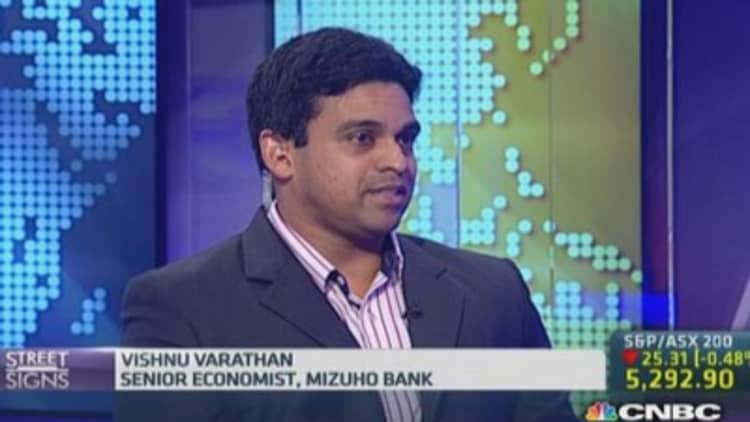The Bank of Japan is likely to maintain its massive monetary stimulus on Tuesday and offer a bleaker view on factory output, following signs that the world's third largest economy was hit harder than expected by a sales tax increase six months ago.
Central bank policymakers are seen sticking to their view that the economy will pass through a temporary soft patch to resume a moderate recovery and achieve the bank's 2 percent inflation target next year without additional monetary stimulus.
An intense burst of monetary and fiscal stimulus, which were the first two arrows of Prime Minister Shinzo Abe's strategy to end 15 years of deflation, has helped boost business sentiment by lifting share prices and weakening the yen.
But his growth strategy to boost Japan's long-term economic potential, dubbed the third arrow of "Abenomics," has disappointed markets and cast doubts on the success of reviving the economy on a sustained basis.
Read MoreRisks to 'Abenomics' growing, whether Japan PM raises tax or not
Markets will focus on whether BOJ Governor Haruhiko Kuroda remains optimistic at his post-meeting briefing, despite recent data suggesting the economy may have entered a mild recession following the April sales tax hike to 8 percent from 5 percent.
"Capital expenditure is pretty strong," Kuroda was quoted as saying at a key government panel last week, stressing that a positive economic cycle remained in place as rising profits prompt companies to boost hiring and spending on equipment.
The BOJ is widely expected to maintain its pledge of increasing base money, or cash and deposits at the central bank, at an annual pace of 60-70 trillion ($547-$638 billion) through purchases of government bonds and risky assets.
After a surprise slump in August factory output, the BOJ is likely to cut its assessment on production from last month, when it said the trend in output was for a continued rise, albeit with some weaknesses, sources familiar with the central bank's thinking said.

Read MoreBank of Japan drives rates below zero, stepping up aggressive easing
Pessimists on the BOJ board may also press for the central bank to offer a bleaker view on the overall economy, but this will be a close call as some board members feel there is no need to change the language as long as the BOJ is sticking to its forecast of a moderate recovery.
The bank now says the economy "continues to increase moderately as a trend, although the effect of the April tax hike remains."
The BOJ is likely to signal in coming months that simply maintaining its stimulus will be sufficient to hit its inflation target, unless there are strong signs Japan will sink into prolonged recession, analysts say.
The central bank has stood pat on monetary policy since deploying an intense burst of stimulus in April last year, when it pledged to achieve its 2 percent inflation in roughly two years via aggressive asset purchases.
Read MoreJapan business sentiment improves: September Tankan survey
Still, the central bank may come under renewed pressure to expand stimulus if the economic weakness persists, ahead a decision expected from Abe by the year end on whether to proceed with another sales tax hike to 10 percent in October 2015.
"The contraction in April-June economic growth was within expectations. The focus is on whether the economy will rebound strongly in the third quarter," Abe told parliament on Monday, when asked whether he will go ahead with the tax hike next year.
Debate at the two-day BOJ policy review, which concludes on Tuesday, lays the groundwork for a more crucial policy meeting on Oct. 31, when the nine board members issue new quarterly long-term economic and price projections.
Given signs of delay in the recovery, they are likely to roughly halve their economic growth forecast for the current fiscal year from the present projection of 1.0 percent, the sources familiar with BOJ thinking said.
Read MoreBank of Japan keeps monetary policy unchanged
That would still be far more optimistic than a 0.3 percent rise seen by analysts polled by Reuters.
But, the sources said, the BOJ is in no mood to cut its consumer inflation forecast yet, worried that doing so will give markets the impression it is not confident of meeting the target next year and heighten speculation of imminent monetary easing.

